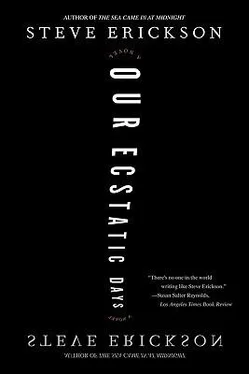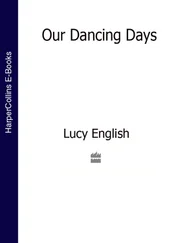first dream I believed that the small flicker of light I saw on the other side of
up into her womb and snuff out? Wherever she is now in the Other Desert, staring around in bewilderment in a place where the same storm seethes and everything is the same except that her child is gone, missing him she doesn’t even know what to call him.
For a while, all she knew she remembered was red. Here’s Lulu’s lie: that she would not die on the lake. It’s now been so long since that day when some other naked version of her left to sail back where she left her small son in that silver gondola that she can’t be certain anymore it really happened at all. She can’t be certain it wasn’t a dream or hallucination, she can’t be certain of anything she ever did or didn’t do, she can’t be certain of her own life except: the one thing she knows for certain was ever real is him —that she knows — and she also knows she wouldn’t die anywhere else but on that lake even if she could, as if she could leave her heart behind and forget where it was and then, having lost it, forget there ever was a heart. So as the lake stopped draining, because it would wait to die with its mistress, so the Mistress in return has laid suspended on the edge of death four hundred days waiting for the lake to die: Well no kidding, Lulu says to herself in her fever. Who’s the point-misser now. She waits for the lake, the lake waits for her. But now in the first vision she’s had in a long time, like those she used to have going back to her very earliest, when she would sit on her bathroom floor reading the patterns of her periods in the porcelain toilet, now as if she’s conducting one final ceremony and as if a melody-snake has wound its way up out of the desert from the ashen place where the lightning took Barbrasita, Lulu has a new epiphany.
In it she runs after Barbrasita to stop her, into the wind and the
the darkness, on the other side of unconsciousness, was the very dream itself,
rain. As she almost catches her, the girl stops and turns and the lightning rips the sky in two and, inside the radiance that Barbrasita becomes, the red that’s been the only thing Lulu could remember finally takes form: and she sees him standing there in the Chateau lair with the small red toy monkey in his hand, wondering how it is he’s been abandoned again. First confronted by this vision, she can’t face the question of whether she left the toy behind accidentally or, so to speak, accidentally on purpose, but once the memory of red takes the form of the red monkey, then in this ozone between living and dying, for the first time since motherhood, Lulu fights to live …
… and opens her eyes, and he’s gone. Opens her eyes and she lies in her bed in the pueblo and, outside, after four hundred days, the lightning has finally subsided. It flashes just enough that the snow falling glitters like glass — but that isn’t what she notices. What she notices is the bird beyond the window of her room, in the high black branches of a charred tree, very calmly unperturbed by the falling ice, as though the tree’s surrounding wisps might actually shelter it. “Look,” she says.
Rocking in a chair at the foot of the bed, resting with a brown baby in her arms, Bronte opens her eyes at the sound of Lulu’s voice, a little astonished. “Hello,” she brings herself to say.
“Look,” Lulu says again, weakly raising her arm to point through the window, and Bronte turns to look.
It takes a moment for Brontë’s eyes to communicate the color of the bluejay to her mind, or perhaps it’s the other way around: “It’s not a trick of the light, is it,” says Brontë. “That is, it’s not really just some strange shade of green and gray mixed together.
which I approached across some limbo between consciousness and sleep, and
It’s really blue?”
“All color is a trick of the light,” Lulu explains.
After a moment, “It’s New Year’s.”
“Really?”
“Day before yesterday, actually.”
Lulu looks at the baby in Brontë’s arms. “How long since …?”
“Five weeks.”
“Five weeks?”
“You would come to just long enough for me to get some soup in you. You don’t remember?”
“No.”
“Some part of you must have wanted to stick around awhile.”
“Have you named him?”
“Not yet,” Brontë sighs, shaking her head. “Want to hold him?”
Lulu has a pang at the sight of him. “His mother: she chose you.”
“No,” Brontë argues, “I was just the one who happened to be there, that’s all.” She doesn’t mention the night she and Barbrasita slept together. “Who else was she going to give him to? Wanda I suppose, but….”
it was like the flicker of a gunshot in the distance, a small flash on the far
“She chose you,” Lulu insists, as vehemently as her weakness allows, “with boobs like those, she figured you were the woman for the job.”
“Well aren’t you feeling better,” Brontë says. “They’re not exactly baby-ready.”
“Tell him that. Put a bottle between them and he’ll never know the difference.”
“He’ll just grow up to be another breast-blinded man like his father.”
“He’ll grow up to be that anyway. The male wangie at its most basic.”
“Hold him while I go get you some soup,” and Bronte gets up and gives the baby to Lulu. While she’s gone Lulu barely brings herself to look in the little boy’s brown eyes. She holds him pretending he isn’t there. She hears his gurgles pretending she doesn’t; the soft brown of his hair, she pretends she doesn’t feel that. The small hand that waves in the air for her finger, she pretends she doesn’t see it. She pretends she’s not thinking of names. Brontë comes back and sets the baby in his cradle nearby and feeds the other woman some soup, then when she’s finished she lies in the bed next to Lulu and picks up the little boy as he starts to cry. Bronte pretends she’s sick and fucking tired of crying babies. She pretends it was the unluckiest day of her life when Barbrasita pushed this child in her arms and ran out into the storm. What I get for seducing her, she thinks. She looks at the baby in her arms who’s stopped crying. “Why does he make me afraid?”
horizon, until I finally identified the sound coming from it as crying, and when
“Because there’s nothing a mother fears more,” Lulu says closing her eyes, “than the chaos of the world.” Before she sleeps, she looks once more to see if the bluejay is still in the black tree outside; together, the two women on the bed watch it with the baby asleep between them. “Brontë….”
“I know.”
“I have to go back.”
Jeez, Brontë wonders, you don’t suppose Armand is still chained up in that dungeon, do you? “I know.”
It’s the fur. There’s something about it that makes his flesh crawl. He would vastly prefer the cold hard metal of regular handcuffs cutting into his skin. With every twist of his body, with every struggle against his constraints, then the more the fur of 2018 (2004–2089) the cuffs softly caresses his wrists. A wave of disgust washes over him. There’s something depraved about it; it’s like a strange animal, mutated and hermaphrodite, curling between Tapshaw’s hands. Oh God don’t even…. He actually thinks he’s going to throw up. “Can’t you use rope or something?” he says.
“I don’t have rope,” the other man says. “I thought you would find those comfortable.”
I finally reached it I saw it was a baby sitting on the ground waiting for
For a moment Tapshaw stops struggling. “You’re a sick….” I’m definitely going to throw up, he thinks, drenched in sweat; another long moment goes by before the feeling subsides. “You’ve taken leave of your senses,” he croaks. Sitting on the other side of the room, Wang considers this: That’s it, he thinks. He turns it over in his head, deliberating it in all its meaning: I’ve taken leave of my senses. Regaining his composure, Tapshaw growls, “You don’t even know how to use that.”
Читать дальше











